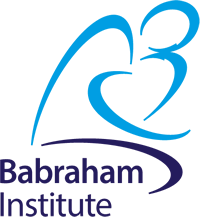The Babraham Institute is a world-leader in fundamental biological research investigating the systems that underpin development and healthy ageing. It is a recognised postgraduate University Partner Institute of the University of Cambridge. This studentship will be available from October 2021 and it will be leading to a University of Cambridge PhD degree. This studentship will be awarded for 4 years.
Please see our website and the BBSRC website for details of eligibility and funding. Non-EU nationals must find funding for academic fees and personal support. In cases where applicants must find their own funding, we will require evidence that the level of funding is at least equal to the standard BBSRC/MRC PhD funding package. The student will join a thriving scientific community situated on an attractive parkland campus near Cambridge. Our 45 students are all members of Cambridge Colleges and participate fully in University social and academic life.
Details of our interactive scientific programmes can be found on the Institute’s website. As a student at the Institute, you will have access to all of our outstanding science facilities, each one providing specialist equipment and expertise to support key research techniques and technologies. In addition to our animal facility, imaging, chemical synthesis and mass spectrometry, we are able to offer transgenics services, flow cytometry, lipidomics, next-generation sequencing and a highly specialist team of bioinformaticians. In addition, several of our facilities operate training programmes to help you develop your own skills in these key research areas. The Institute’s research groups also incorporate a selection of other cutting-edge specialties including single-cell and multiomics approaches.
Students will not be able to take up an award unless they meet all University eligibility criteria and are successful in securing admission to the University. In addition, they will not be able to apply for a visa (if needed) until they hold an unconditional offer from the University.
The closing date for the application is Wednesday, 27th January 2021. Incomplete applications will not be considered.
How to apply
Please send your applications to [Email Address Removed].
Applicants should submit the following documents;
- Curriculum Vitae – including nationality and residency information, qualifications, degree result (if applicable), details of any lab based project or laboratory placements
- Covering letter
- 2 references
If you require further information about the application, please contact the Graduate Studies Assistant ([Email Address Removed]).
Does inappropriate DNA replication provide a mechanism for acquisition of drug resistance?
This is an iCASE studentship in collaboration with Astra Zeneca Oncology R&D
Successful cancer cells must be adaptable in the face of environmental challenges, as finding a means to continue growth under difficult circumstances will usually be a better strategy than passively waiting for the environment to improve. Unfortunately, adaptation bedevils drug development by allowing cells to retain or restore normal function in spite of chemotherapeutic action. Understanding adaptive mechanisms is therefore of major medical importance, considering the frequency with which cells gain resistance to targeted chemotherapeutics.
Ideally, determining specific mechanisms by which cells acquire mutations that bestow drug resistance should reveal novel therapeutic vulnerabilities to exploit in combination therapies aimed at enhancing and extending the effectiveness of targeted chemotherapeutics. We are using emergence of resistance to inhibitors of Receptor Tyrosine Kinases and the downstream Ras-Raf-Mek-Erk pathway as a model system to understand the de novo formation of adaptive mutations.
Drug resistance mutations may exist as random mutations in a cell population, but our ongoing research on MEK inhibitors shows that pre-existing mutations are often of lesser importance to new mutations that occur during drug treatment. These new mutations form amongst drug tolerant persister cells (DTPs), which survive extended drug treatment in culture and eventually give rise to proliferative clones after extended periods of apparent arrest. Our ongoing research suggests that DTPs undergo occasional DNA replication under sub-optimal conditions, leading to replication stress and increased mutagenesis. In general, DTPs provide a window into underlying causes of acquired drug resistance, but DTP biology remains poorly investigated.
Hypothesis
That genome instability results from aberrant DNA replication or DNA repair during treatment with drugs that impair expression of DNA repair and replication genes, and this drug induced genome instability underlies the acquisition of de novo drug resistance mutations.
Project Overview
This project will use the acquisition of resistance to the AZ drug Osimertinib, the best-in-class EGFR inhibitor, in PC9 cells as a model system.
- We will first apply scRNAseq during Osimertinib treatment to characterise gene expression during treatment. A single cell approach will reveal the status of individual replicating cells, which is likely to be heterogeneous as cells do not react uniformly under extended treatment.
- We have developed a state-of-the-art method for detecting replication stress and DNA damage, TrAEL-seq, which profiles DNA replication patterns with high sensitivity. TrAEL-seq will be used to replicating cells to understand replication stress caused by drug treatment.
- Replication stress can give rise to extrachromosomal circular DNA (ecDNA), which frequently harbours gene amplifications that bestow drug resistance. It would be particularly exciting to connect drug-assocatied replication stress in DTPs directly to formation of ecDNA, which we will test using circular DNA sequencing.
Bringing together these state-of-the-art methods will reveal when and how genomic and transcriptional diversity arises across the time-course of Osimertinib treatment, allowing us to raise and test hypotheses regarding vulnerabilities in mechanisms underlying formation of resistance mutations and transition to resistance.
Informal enquiries should be sent to Dr Jon Houseley ([Email Address Removed]).
Keywords: Drug resistance, DNA replication, Replication stress, Cancer, chemotherapy
Websites:

 Continue with Facebook
Continue with Facebook



